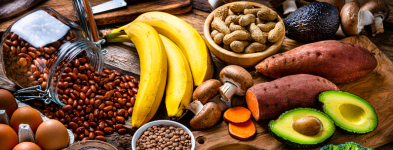

3 minute read
Are You Getting Enough B Vitamins from Your Diet?
Published June 3, 2023. Last updated January 13, 2026.
B vitamins are building blocks for our cells. They support brain and heart function, digestion, and hormone production. They also help turn the food we eat into energy. B vitamins are found in many foods including meat, grains, and vegetables, so most people get enough if they are eating a balanced diet. Consuming a poor diet that is low in nutrients, taking certain medications, or having a medical condition that keeps nutrients from being absorbed, can lead to vitamin B deficiencies. Excess amounts of B vitamins are eliminated in the urine because they are water soluble, so getting too much (toxicity) is rare.
Quest Vitamin B2, B3 & B5 Test Panel
We make it easy to check the levels of several important micronutrients with the Quest Vitamin B2, B3 & B5 Test Panel. This panel measures the levels of vitamin B2, vitamin B3, and vitamin B5 in your blood to help detect any deficiencies. It is meant to supplement any of the lifestyle vitamin deficiency test panels. It’s available to purchase online; no doctor’s visit is required.
Common vitamin B deficiencies
Vitamin B2, also known as riboflavin, helps produce and grow cells and keeps your nervous system healthy. Our body stores very little riboflavin, so we need to get it daily through our diet or through supplements. Symptoms of a deficiency may include fatigue, swollen mouth or tongue, liver problems, and hair loss. A long-term deficiency may lead to anemia, reproductive and nervous system problems, and cataracts.
Vitamin B3, also known as niacin, functions as a coenzyme in the body, with over 400 enzymes dependent on it for different reactions. It is important for making cholesterol and fats, creating/repairing DNA, and protecting cells from damage. A deficiency in vitamin B3 may cause depression, fatigue, headache, digestive issues, and memory loss. A long-term deficiency can lead to a serious condition called pellagra which can affect the nervous and digestive system and can be fatal if not addressed. Pellagra is reversible by adding a niacin supplement to your diet.
Vitamin B5, also known as pantothenic acid, helps the nervous system and liver, synthesizes good cholesterol by making and breaking down fatty acids, and helps with digestion. People who are deficient in vitamin B5 may experience symptoms including headaches, fatigue, irritability, and digestive problems.
If you have a medical condition that doesn’t allow you to properly absorb these vitamins, or you are taking medications like a proton pump inhibitor or a histamine blocker, you should get tested for vitamin B deficiencies.
Dietary sources of vitamin B2, B3, and B5
Sources of vitamin B2 include meat, fish, poultry, eggs, milk, yogurt, cheese, spinach, almonds, and is fortified in cereals and bread.
Vitamin B3 include red meat, beef liver, poultry, fish, brown rice, legumes, bananas, nuts, and seeds, and is fortified in processed grains like cereal and bread.
Vitamin B5 is found in beef, chicken, liver, milk, eggs, potatoes, brown rice, oats, avocados, broccoli, mushrooms, nuts, and seeds, as well as fortified grains.
Test your micronutrient levels with Quest
Quest is here to support you on your journey to good health. We offer a convenient way to check vitamin and mineral deficiencies commonly associated with a vegetarian diet. The Quest Vitamin B2, B3 & B5 Test Panel is available to purchase online today.
No doctor visit is required to buy your own lab test at questhealth.com. PWNHealth and its affiliates review your purchase to ensure it is medically appropriate before submitting the test order for processing. PWNHealth also reviews your test results and will contact you directly if they require prompt attention. Included in each purchase is the ability to discuss your test results with an independent healthcare provider; however, you are also encouraged to speak with your primary healthcare provider.
Vitamin B testing for children ages 10+
Parents and guardians can purchase the Quest Vitamin B2, B3 & B5 Test Panel, the Quest Vitamin B12 & Folate Test, and the Quest Vitamin B12 Test for their children (ages 10+) at questhealth.com. No doctor visit is required for purchase, but physician oversight is included throughout the process.
Tests featured in this article:
Sources
- Riboflavin – Vitamin B2. Accessed April 10, 2023 https://www.hsph.harvard.edu/nutritionsource/riboflavin-vitamin-b2/
- Riboflavin Fact Sheet for Consumers. Accessed April 11, 2023 https://ods.od.nih.gov/factsheets/Riboflavin-Consumer/
- Niacin – Vitamin B3. Accessed April 10, 2023 https://www.hsph.harvard.edu/nutritionsource/niacin-vitamin-b3/
- Niacin Deficiency. Accessed April 11, 2023 https://www.webmd.com/diet/niacin-deficiency-symptoms-and-treatments
- Pantothenic Acid – Vitamin B5. Accessed April 10, 2023 https://www.hsph.harvard.edu/nutritionsource/pantothenic-acid-vitamin-b5/
Remove Product?
Shop Tests
Top Nav Jump Mobile
Top Nav Jump Shop Tests
Top Nav Jump Help Me Choose
Top Nav Jump Discover
Verify that it's you
We sent a verification code to
Haven't received a code or need a new code? Resend a new code
It may take a minute to receive your code. Be sure to check your email filter or spam folders.
All rights reserved. Copyright 2023
Address Verification
Quest does not currently support P.O. Box addresses, please update to a valid address.


